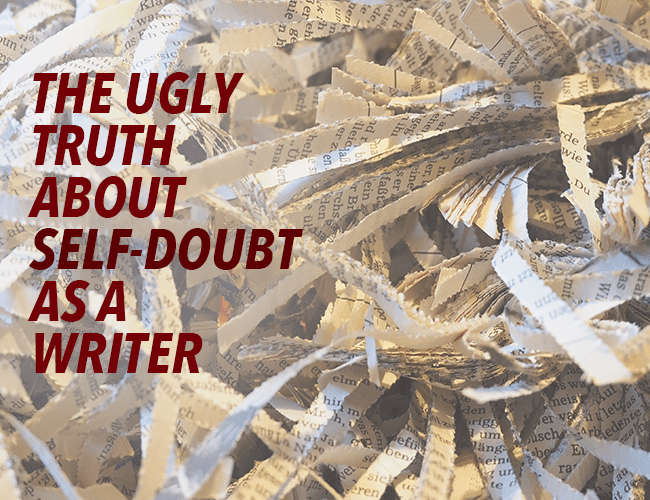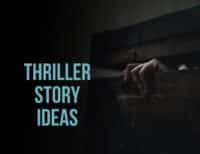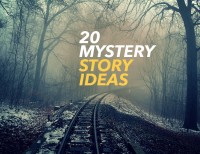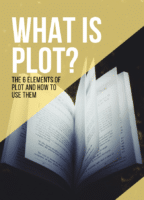Today's topic won't be a comfortable one. I'm going to address an issue I'm pretty sure you don't want to hear—but by the time I'm done, you'll be armed, better prepared, and stronger than you were. And what is this uncomfortable topic? Self-doubt.

No matter what you do, your doubt as a writer will never go away.
The Ugly Truth
We all have a hopeful goal we think will finally kill that self-doubt for good. It's usually phrased like an if-then statement: “If I ever get _____, then I'll ______.” E.g., “If I get published, then I'll call myself a writer.”
Sound familiar? See if any of these feel like your hope:
- If I get an agent, then I'll stop doubting.
- If I earn a certain number of good reviews, then I'll finally feel confident.
- If my writing gets approval from that person, then I'll be a real author.
- If I'm a bestselling author, then I'll finally feel like I made it.
- If I finish my book, then I'll feel like a real writer.
The list could go on, of course. Right now, you may be thinking of your own if-then statement, and that's good. You need to face it.
Here's why: that if-then statement is a lie.
I know, I know, that is the worst possible thing I could tell you. Do I mean to say that you'll never feel more confident about your writing? That you'll struggle with the feeling you're shouting into the void for the rest of your life? That you'll never feel as confident as other authors look?
No, not quite. The self-doubt changes, lessens, and sometimes goes away. It also comes back. I need you to know that nothing you ever gain or accomplish will erase that doubt completely. I need you to know so that when the self-doubt hits, trips you up, bites the back of your neck in the middle of your successes and drains the confidence out of you, you will be prepared.
Writer's doubt does not mean you suck.
Writer's doubt does not mean you can't do this.
Writer's doubt is, in fact, a liar. Your self-doubt comes from your inner critic, who is, as we've established, a jerk. I know this from experience—and it's not only me. Check this out.
Every Writer Has Self-Doubt
I know I do. I'm a twice-over bestselling author, and I'm still plagued with doubts; I feel like I can't do this, that I'm going to be found out somehow as being “less good” than other authors, or less educated, or just somehow a fraud. The amazing thing is I'm not alone.
You know Neil Gaiman? One of the most celebrated living authors today? He's written books for adults, children, and anyone in-between. He's created graphic novels, scripts for movies and television, and won so many awards (four Hugos, two Nebulas, a Newberry medal, six Locus awards, and many more) that it should be really really clear he's a good writer. Right?
Doubt still dogs his heels.
Surely not, you say. Well….
The problems of success can be harder because nobody warns you about them.
The first problem of any kind of even limited success is the unshakable conviction that you are getting away with something, and that any moment now, they will discover you. It’s Impostor Syndrome—something my wife Amanda christened the Fraud Police.
In my case, I was convinced that there would be a knock on the door, and a man with a clipboard (I don’t know why he carried a clipboard, in my head, but he did) would be there to tell me it was all over, and they had caught up with me, and now I would have to go and get a real job, one that didn’t consist of making things up and writing them down, and reading books I wanted to read. And then I would go away quietly and get the kind of job where you don’t get to make things up anymore.
—Neil Gaiman, Commencement Speech at the University of the Arts Class of 2012
You'd think that doubt would have gone away by the third Hugo, perhaps.
Not enough? How about we hear from Stephen King (twelve Stokers, three Locus awards—oh, you get the idea):
I'm afraid of failing at whatever story I'm writing—that it won't come up for me, or that I won't be able to finish it.
—Stephen King, Rolling Stone 2014 interview
Or this:
I have spent a good many years—too many, I think—being ashamed about what I write. I kept hearing Miss Hisler asking why I wanted to waste my talent, why I wanted to waste my time, why I wanted to write junk. I think I was forty before I realised that almost every writer of fiction and poetry who has ever published a line has been accused by someone of wasting his or her God-given talent.
—Stephen King, On Writing
You'd think being Stephen Freaking King might have slain that doubt-dragon, but nope. It did not.
Really, Every Writer Has Self-Doubt
Those two authors not your cup of tea? No problem. Here are a few more.
Dear God, I am so discouraged about my work. I have the feeling of discouragement that is. I realize I don’t know what I realize. Please help me dear God to be a good writer and to get something else accepted.
—Flannery O'Connor
Each day is like an enormous rock that I'm trying to push up this hill. I get it up a fair distance, it rolls back a little bit, and I keep pushing it, hoping I'll get it to the top of the hill and that it will go on its own momentum. I'm very deeply inculcated with a sense of failure for some reason. And I'm drawn to failure. I often write about it, and I'm sympathetic with it I think, because I feel I'm contending with it constantly in my own life.
—Joyce Carol Oates
Such fear of writing always expresses itself by my occasionally making up, away from my desk, initial sentences for what I am to write, which immediately prove unusable, dry, broken off long before their end, and pointing with their towering fragments to a sad future.
—Franz Kafka
I have been successful probably because I have always realized that I knew nothing about writing and have merely tried to tell an interesting story entertainingly.
—Edgar Rice Burroughs
The more scared we are about our calling, the more sure we can be that we have to do it.
—Stephen Pressfield
I seek strength, not to be greater than other, but to fight my greatest enemy, the doubts within myself.
―P.C. Cast
Writing is finally about one thing: going into a room alone and doing it. Putting words on paper that have never been there in quite that way before. And although you are physically by yourself, the haunting Demon never leaves you, that Demon being the knowledge of your own terrible limitations, your hopeless inadequacy, the impossibility of ever getting it right. No matter how diamond-bright your ideas are dancing in your brain, on paper they are earthbound.
―William Goldman
What to Do About That Self-Doubt
So by now, I hope you see the ugly truth: no matter what you do, that doubt will dog you. But that is not the end of your story.
Step one to facing writers doubt is acknowledging you're going to have it. That doesn't make you broken or weird or deficient. That makes you a writer.
I have previously given you this advice: “Write it anyway.” Guess what? You need to write it anyway. Don't listen to the doubt that tells you to quit.
Step two is giving yourself permission to write absolute garbage. Yes, this means what you write may be “all wrong.” In our worst moments, it's often difficult to figure out plot points and character arcs; what we write is just nonsense on the page, deletable, failing to develop characters or move the story in any way at all.
And that's okay. There is no such thing as wasted words. Words you don't use or have to delete are still not wasted. Every time you put words on paper, no matter how clumsy they are, strengthens you as a writer. No, you aren't practicing bad writing; you're just practicing writing. If you keep going, you will improve—even when writing crap.
And now for the really hard one: step three is the choice to believe a truth you cannot see.
Yes, that's faith. It doesn't have to be a religious word. All it means is choosing to believe in something you cannot, at that moment, verify.
There will be times you can verify it—good reviews or responses from beta-readers, good moments when you write something and know it's just right, great moments with your writing group in which they understand exactly what you were trying to say. During those times, you can see the truth: you are a writer, and you are getting better, and if you keep going, the story you're trying to tell will take shape.
When doubt hits, you can't see that truth. When writer's doubt dogs your heels, bites your neck, hides the sun, you can't even feel that truth. That's the moment to hold onto it—even though it doesn't feel real anymore.
The Writer's Manifesto
The way I handle this is to write a manifesto. Something like this:
- I will write when I don't feel like it.
- I will write when it hurts.
- I believe I can write, even if I suck a lot.
- People want to read what I write. I know because I want to read it, too.
- It's okay if I suck right now. I will figure it out and get better.
- I will not stop writing.
The doubt will pass. It will also return. If you hang on to these three steps, you'll make it through.
Facing the Ugly Truth and Winning
- Step one: accept the ugly truth that you will never get rid of your doubt. That means being prepared for its coming.
- Step two: give yourself permission to write terribly when the doubt comes. Do NOT listen to the doubt and stop writing. Writing terribly is far, far better than not writing at all; bad practice is better than no practice.
- Step three: believe you are a writer, and that this time of doubt will pass, and that being a writer is worth the fight.
It's that simple and that hard.
It's also worth it. If I can do this, you can, too. We're in this together, fellow writer. The doubt will return, but that doesn't mean you have to let it win.
How is your battle with writer's doubt going? What do you do to beat it? Let us know in the comments.
PRACTICE
Ready for the challenge? Here it is: for fifteen minutes, work on your own writer's manifesto of the truths you will hold on to during those dark and doubting times.
For many of you, you haven't thought much about those truths yet. You may not be published, and may not have a support group or even encouragement from family or friends. That's okay. If all you have is the gut-deep knowledge that the story you have to tell is good, then that is enough. That instinct isn't wrong. If you want to read the thing you want to write, other people will, too.
Take that fifteen minutes and work on your manifesto. Make sure it's truths you can hold on to even when you can't see them. Doubt is coming; that means you'll get the chance to kick it in the behind.
When you're done, share your manifesto in the comments. Remember to leave feedback for your fellow writers—let's spur each other on to out-write our doubt.







Best article yet
Thank you
Works in all walks of life – every single day
It does, David!
Great article. I like what you say about acknowledging self-doubt. It’s totally normal, and the best part is, you don’t have to believe it’s true or let it stop you. For me, I don’t doubt myself so much, but I *am* harsh in judging my writing, especially after reading something really (really) good. Then I look at mine and think “OMG this is such trash” But that’s a good thing, really. It makes me work harder (and I know it’s not trash, but even if it were, so what? Keep writing 🙂
I’m so glad this helped, Leah. You’ve got it: keep writing.
The “judging” thing is a big one with me. We are our own worst critics when we don’t have to be. I think when we stop being so harsh on ourselves, we can allow ourselves to write more freely. Allow ourselves room for error, in turn giving ourselves opportunity to improve.
Thank you. I needed this.
me too.
I’m glad this helped! It was scary to be so honest, but I knew we all needed to know.
Really glad to hear it, Caroline. I figured if I was going through this, I wasn’t the only one.
Here is a post I placed in the Whiteboard a few minutes ago. What I have posted here is another evolution.
Fear crept in on tiny little cat feet, the clickity-clack of tiny little claws could not be heard on those tiny little feet. Closer fear crept, closer and closer, sneaking and creeping from shadow to shadow like animated characters of old.
“Fear is the mind killer,” he said sotto voce. “Fear is the little death that steals your soul and robs your will.” There came a whistling inhalation of breath to set his resolve. “Fear is butterflies flying in chaos. The trick is to make the butterflies fly in formation, and fear becomes your friend.”
The tappity-tap of a keyboard at last rang through the room.
Oooh, VERY nice!
Great article. After a lifetime of wanting to write and finally creating the space for it, I’m no longer confident that what I have to say is important. Still, I continue to write and will live my way into acceptance that I must say it, whether or not it is “important.”
As long as you don’t stop, the message you’re telling will eventually come true. And if it’s important to you, it will be for someone else, too. It just takes time to find them.
Thanks, Ruthanne. The promotions piece is most difficult for me, so finding “them” a real challenge.
I cried all the way through reading this post, because it is hitting me particularly hard right now. I’m in the midst of writing a submission for an anthology, which I don’t even know if it will be accepted, and having trouble finding the pieces I want to put into it. Fear is part of the problem. Certainly self-doubt — someone else has already submitted what I want to say and said it better. But I will go back to my Word doc and finish what *I* have to say.
Many years ago I was writing a thesis and having a great deal of difficulty with one section. “I’m not really a writer,” I confessed to a professional writer friend. “Of course you are,” she said. “We all feel that. Just keep writing.” And I did.
WOW. Thank you so much for sharing this. You’re not alone, and yes – if you write, you are a writer. Period.
Keep moving forward. I know there’s a cost to that, but it’s worth it.
I think this challenge hit at the right time for me. Here is a 1/3 bite of what I wrote: “Lets admit. I have an advantage over some aspiring writers who logged into the site today. I’ve been published many times. Published many Fridays over months and months and over years and years.
Means so little now. The editor would call it “copy,” not literature. They had it right and that was OK, for then.’
That’s powerful! And it doesn’t mean little; it was one step along the way, and an important one. Never underestimate the power of putting your words in front of other people to judge. That step is a terrifying one, and one many writers never take. You’re on the right path.
Ruthanne, thank you for your comment. I need another person’s viewpoint. Yes, I think it helps me move along. With years of a weekly responsibility which brought only an occasional reader comment I am used to moving ahead without expecting reader praise or even reader encouragement. So, that may not be desirable but I can live with it.
Bam.
Awesome.
Glad it helped!
Anything on “Writing the really painful shit that has caused creative constipation? How to push it out amid the pain, tears, and locked up memories? That would be awesome….
I love writing so much and I love it when I get good reviews from readers. So when I’m feeling self doubt, I try reading those reviews again to remind myself that I am a good writer but that doubt is way too overwhelming. When I feel like that, I read reviews and feel like everything a reader is telling me is a lie. I feel like I’m not a good writer. I never will be. So I give up.
Yes, I know; that’s why I didn’t actually suggest that. We need something specific that we can hold onto even when we can’t FEEL it. Sort of like how scientists know there are things out there they haven’t really discovered, but believe those things are there,so they keep searching.
-I will write everyday even when I don’t want to.
-I won’t let doubt tell Me I can’t do this.
-Even if it’s terrible I will write it anyway.
-Practice makes prefect.
YES!! Especially that last one!
Thank you I look up to you as my mentor of writing. Whenever you post something I make sure to read it. It has help me so far. Thank you again.
that’s the words that i need. it’s just yesterday i felt like i write garbage so i stop it
Wow, Drea – I’m so glad this helped. Keep writing! Garbage or no, it’s helping you move in the right direction.
I definitely have that condition. Especially, my grammar.
We all struggle somewhere! The amazing thing is that if we know where we struggle, we can improve.
Ruthanne,
Thank you so much for this post! I always need this kind of encouragement to keep me going when the going gets tough. Even though my writing is going well right now, I struggle with self-doubt frequently. I think I will start my own writing manifesto to keep me on the right track when self-doubt finds me again.
Thanks again!
Thank you from the bottom of my heart for this post.
It was like a breeze of fresh air to clear the doubt from my clattered brain.
Now I can go back to my writing again.
Thank you. Thank you. Thank you. I am always tormenting myself over this. I’m never sure if I am good enough. Am I wasting my time, and worse, other people’s time. Great advice that I’m going to write down and hang in my writing room.
I agree. It’s a consolation to discover our common weaknessess.
I procrastinate writing because once it is down on paper my inner critic is free to call it crap. Especially when it is particularly good.
We are our own worst enemy. Procrastination on anything is my biggest problem. Mostly it’s because I am lazy, but then there’s the fear factor….I’d rather be called lazy than afraid of anything. But, I’m too lazy to fix it! LOL!
Thomas Mann nailed it: “A writer is a person for whom the act of writing is more difficult than it is for other people.” I think it’s because we’re all driven by how well we see what a story COULD be, and so we see the gap between that and what we’ve done. We’re always trying to fill that gap, but the farther we get the more we get unclear glimpses of still better quality we can’t reach yet.
So we need permission to “suck,” and to put out work that isn’t perfect. Because nobody but us can see what it could have been.
Hello, Ruthanne, thank you for this indepth post.
I love the citations from famous writers and their self-doubt. It helps me to realise that, no matter how expert they are at writing, or the prizes won and worldwide popularity, I have something in common with them… self-doubt.
My self-doubt stems from a question, that is, who will want to read what I write? Will readers consider it pure nonsense and trash my novel?
Then I get down to writing, thinking, well write, anyway, it just might turn out to be a good story.
I’m taking your advice to keep writing. It’s a challenging passtime. I plan my story mentally before attempting to write the first sentence. This makes it much easier to get started.
My worst point is procrastination. Can’t get rid of this devil.
Great article Ruthanne! Thanks for it, because it’s just what I need. I’m encouraged to keep writing, no matter what. Here is my manifesto:
• I am a writer, so I will write every day
• I will write for at least 30 minutes every day regardless of how I feel.
• I will view any feeling of self- doubt as part of the challenges authors face •
I will treat negative feelings about writing as a passing phase
• I am a winner, so I won’t quit. Quitters never win, winners never quit!
So I will keep on writing!
This was so good to read and has helped me see what to do when self doubt has a go at Me
I don’t struggle so much with believing that I am a writer, and a good writer despite all the improvement I need, but with finishing a novel. I have forced myself to focus on one novel instead of twenty (I have a list going, I have more than twenty novels in-progress or at least thought of) so that I WILL finish something. Two years and 16000 words later I wonder if/when I’ll ever finish, marvel at how anyone ever finishes novels in shorter periods of time, and dream of the glorious days when I can finally be done with this novel. Not because I dislike it, not because I’m sick of my characters and the world and the plot, but because I have to finish this novel if only to prove to myself that I CAN, that it is doable and can be done again. Ten thousand words in one project was a huge milestone for me, and I’m looking forward to hitting twenty thousand. And then thirty, forty, fifty… however many it takes to finish this.
Yeah! This is very common for all writers and I happy to find your article. It`s a kind of a relief that I`m not the only one who has such thoughts. I`m so strict to myself and when I find an inspiration to write, it`s getting easy to be so happy to get a good accounting essay for example at https://essayvikings.com/accounting-paper. Thanks again for such useful article. I will totally recommend it to all my friends.
Thank you for this post. I have this gripping fear that I am not good enough to call myself a writer. I have this fear that I am a fraud because even though I have a degree in the field, I haven’t done anything with it. I don’t have a manuscript. I’m not published anywhere. I have this fear of submitting anything I’ve written to magazines and contests. It’s like I’m saying to myself, “How dare you call yourself a writer.”
But I’m working on overcoming those doubts. Yes, they will always be there. But I’m reminding myself to take steps. I won’t accomplish everything I set out to do in a day, a week, a month, or a year. It will take time, and it’s up to me to use that time the best way I know how. So I plug away and keep writing. I have friends I share my work with and they encourage me to keep going. I remember that I have family who supports me. And because of these facts, I will continue to write.
The more I indulge myself into research and workshops, the more I feel inferior. So many people trying to do the same thing….but the voice comes back….they haven’t heard from you yet! Keep going George!
Jeff Goins has some good tips on how to get over that. Writers write. You write. Hence, you ARE A WRITER. Don’t let that voice of doubt stop you from achieving your dreams.
We as writers are so driven by the numbers. Every time I feel like throwing in the towel, I remember what a friend once said “If you help just one person, you’ve made a difference.” If just one person reads my post, clicks on my image or likes my tweet, I keep going. I admit I would like more, but for now I am content. And I keep writing. I believe this is called Faith. Thanks for the encouragement.
I’m that one person, today! Helping one person makes all the difference.
Aw, thanks!
Thank you for the article. Self-doubt is real. And, trying to overcome it is so hard.
Those quotes really got to me.
This is also true for other types of writers! This has been true for me as a blogger and copywriter, and I struggle almost every day with feeling like my work is crap and I’m in the wrong career. It sucks! But I keep doing it.